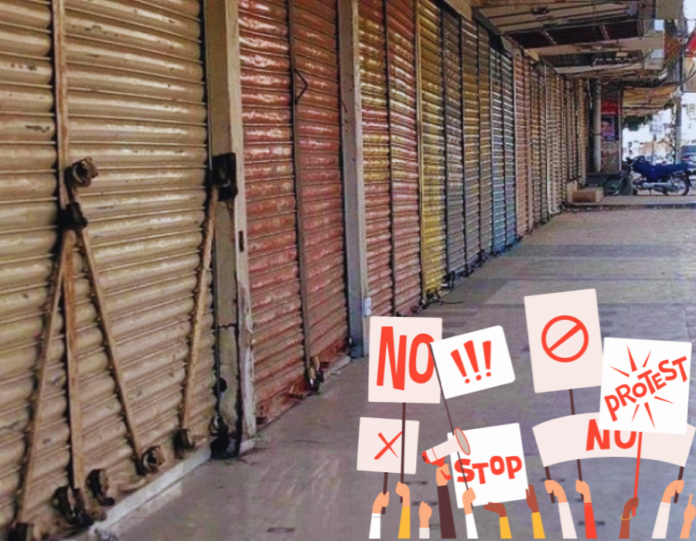Traders across Pakistan observed nationwide shutter down strike today, protesting against the government’s taxes hike and increasing electricity costs. Major political parties, including Jamaat-e-Islami (JI), Jamiat Ulema-e-Islam Fazl (JUI-F), Pakistan Tehreek-e-Insaf (PTI), and Awami National Party (ANP), have thrown their support behind the shutter down strike, uniting in opposition to the government’s policies.
In Karachi, the Anjuman-e-Tajiran Karachi announced a complete business shutdown in solidarity with the shutter down strike. Javed Shams, President of the All Pakistan Anjuman-e-Tajiran’s Sindh chapter, stated, “The political leadership has failed,” as he expressed support for the strike. He confirmed that all businesses, from small shops to major markets across Sindh, will remain closed today, rejecting the increase in taxes and electricity bills. Javed Shams emphasized that the ruling class’s policies are threatening the livelihoods of the business community, deeming the current “Trader Friendly Scheme” unacceptable.
The Karachi Electronics Dealers Association (KEDA) has also backed the shutter down strike, with its President Mohammad Rizwan noting widespread participation from trade unions nationwide. Mohmmad Rizwan warned that the strike could extend if the government fails to address the traders’ grievances.
Atiq Mir, President of the All Karachi Traders Union, described the shutter down strike as representing the concerns of the public, not just traders. He highlighted that inflation is a major concern for everyday citizens.
Government Response to Strike
In response to the shutter down strike, Rana Ihsaan Afzal Khan, Coordinator to the Prime Minister on Implementation and Monitoring, asserted that the government would not be pressured by the traders. Ihsan Afzal Khan invited traders for discussions if they believed the government’s actions were wrong, stressing that Prime Minister Shehbaz Sharif has revamped the Federal Board of Revenue (FBR) to ensure the retail sector contributes to the tax net.
Widespread Shutter Down Strike Observed Across Provinces
In Sindh, cities including Nawabshah, Tando Allahyar, Thatta, and Sajawal witnessed full business closures, with both central commercial areas and smaller businesses adhering to the shutter down strike. Sindh Traders Association President Waqar Memon criticized various taxes, labeling them as anti-business policies.
In Punjab, cities such as Vehari saw all business centers shut down in response to the Central Traders Association of Pakistan’s call for a nationwide shutter down strike. Major commercial areas like Club Road, Jinnah Road, and Rail Bazaar were completely closed, with association leaders condemning the government’s “cruel taxes.”
In Gujranwala, the shutter down strike saw the closure of key markets, including Cloth Market, Steel Market, and Sanitary Market. The local mobile phone association also extended support to strike. Peshawar in Khyber Pakhtunkhwa joined the shutter down strike, with major markets such as Sadar Bazaar, Qisa Khwani, and Khyber Bazaar remaining shut, as trade unions demanded a rollback of increased power bills and tax reductions.
In Balochistan, cities including Quetta, Hub, and Mastung experienced widespread shutdowns. Traders in other cities such as Dera Ismail Khan and Chichawatani also supported the shutter down strike, demanding the withdrawal of what they termed as “cruel” taxes and reductions in electricity costs.
Future Strategy by JI
JI Spokesperson Qaisar Sharif addressed a press conference in Karachi, affirming that traders and industrialists are in full support of the shutter down strike. He warned that if the government does not address the issues, JI will unveil a future action plan after consulting with traders and industrial organizations. Sharif insisted on the government ending unfair contracts with Independent Power Producers (IPPs) and fulfilling agreements with JI, emphasizing that the party will not relent without achieving relief for the people.
The nationwide shutter down strike reflects mounting frustration over the government’s economic policies, with businesses and citizens alike demanding immediate reforms to ease the financial burdens of taxes and electricity costs. As the situation develops, all eyes are on the government’s next steps in addressing the widespread unrest and potential negotiations with trade unions and political parties.


